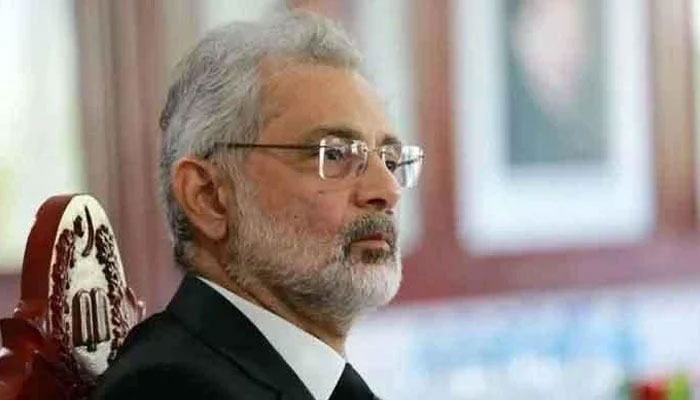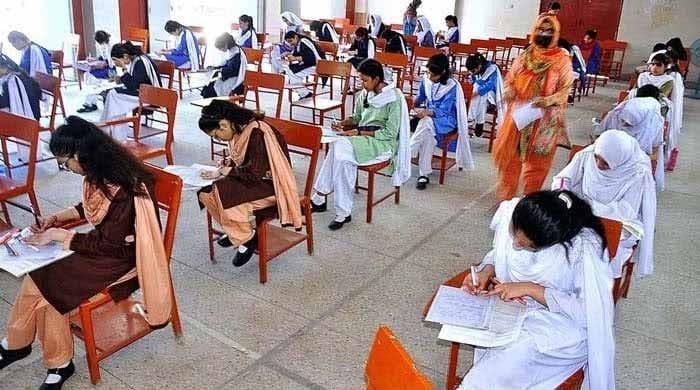CJP Isa says July 12 reserved seats ruling not binding as review petitions remain pending
"I consider it my duty to point out constitutional violations and illegalities in majority’s short order," says CJP
October 22, 2024

- July 12 verdict "not binding" as review petitions still pending: CJP.
- States forum issued clarification from SC was "coram non judice".
- Clarification can't be categorised as SC decision: dissenting note.
ISLAMABAD: In a detailed minority judgment, Chief Justice of Pakistan Qazi Faez Isa on Tuesday stated that the implementation of the top court’s July 12 verdict in the reserved seats case was not binding as the review petitions in the case were still pending and not fixed for hearing.
The detailed note came days after the eight judges of the top court, in its second clarification, reiterated that parliament's amendment to the Elections Act does not have a retrospective effect and it cannot undo the SC’s judgment in the reserved seats case — a move that irked the top judge.
In his dissenting note, the CJP pointed out the "constitutional violations and illegalities in the majority’s short order of 12 July 2024, and the majority’s detailed judgment of 23 September 2024, the order/clarification of 14 September 2024 and the Clarification of 18 October 2024..".
The CJP hoped that his colleagues in majority would “reflect and correct their mistakes” and ensure that Pakistan is governed in accordance with the Constitution.
In a detailed dissenting note, Justice Isa said that unfortunately, the review petitions against the majority short order could not be heard because his colleagues — Justice Syed Mansoor Ali Shah and Justice Munib Akhtar — outvoted him on the committee constituted under the SC Practice and Procedure Act, 2023.
He went on to say that the majority of eight judges decided to part ways with the court, comprising of thirteen judges, which had heard the appeals.
“The majority set up its own virtual court, permitted the making of ‘an appropriate application’ by the ECP and PTI, and directed that such appropriate application would only be heard by them whilst cloistered in Chambers.”
He further said: “In doing this the majority of the Hon’ble Judges effectively legislated, because neither the Constitution nor any law permits what they did.”
Incidentally no party or counsel during the hearing ever suggested the course of action which the majority adopted, and neither the majority’s short order nor the majority’s judgment offers an explanation to justify it, CJP Isa added.
“In effectively legislating the Hon’ble Judges in the majority also contradicted themselves.”
The majority “disregarded the precedents of this Court,” the CJP said, adding that they not only “carved out a separate eight-member court” from the thirteen-member court, but also innovated further by not finally concluding the hearing of the appeals, because they permitted appropriate application to be filed, introduced timelines and changed what the Constitution provided.
“Permitting appropriate application to be filed by the ECP or the PTI meant that the case was not decided or disposed of.”
“In civil cases after a judgment is pronounced the decree follows. In constitutional cases too a judgment can be executed, provided it is finally and conclusively decided,” the top jurist added.
“The majority’s short order and the majority’s judgment did not conclude the appeals,” Justice Isa observed.
He added: “The well trodden legal path was abandoned by the majority which created unnecessary and avoidable problems.” Additionally, the right of review, which Article 188 of the Constitution grants, was also effectively negated, he stated.
He wrote in its note that there was no decision which could be stated to be binding since the appeals were not finally decision, in terms of Article 189 of the Constitution. The CJP also stated that contempt of court proceedings cannot be initiated in this scenario.
Moreover, the CJP stated that the purported ‘order’ uploaded on the Supreme Court’s website on September 14 was done without informing him, other judges in the minority, and bypassing the Registrar and the office of the Supreme Court.
The 14-page dissenting note also stated that the “majority’s order/clarification was admittedly passed without first listing the cases, without issuing notices to the parties and without issuance of the requisite notice to the Attorney-General for Pakistan”.
CJP Isa remarked that the SC clarification on the reserved seats case cannot be stated to have been issued by a “Court”, adding that the forum which issued them was “coram non judice”.
In terms of Article 189 of the Constitution, the said clarification could not be categorised as a SC “decision”, therefore, they need not be followed or acted upon.
Prior to this dissenting note, the eight judges of the Supreme Court had issued the clarification in chambers at Islamabad and Karachi in response to the Civil Miscellaneous Applications (CMAs) filed by the ECP and Pakistan Tehreek-e-Insaf PTI) seeking clarification.
The eight judges included Justice Syed Mansoor Ali Shah, Justice Munib Akhtar, Justice Muhammad Ali Mazhar, Justice Ayesha A Malik, Justice Athar Minallah, Justice Syed Hasan Azhar Rizvi, Justice Shahid Waheed and Justice Irfan Saadat Khan.









